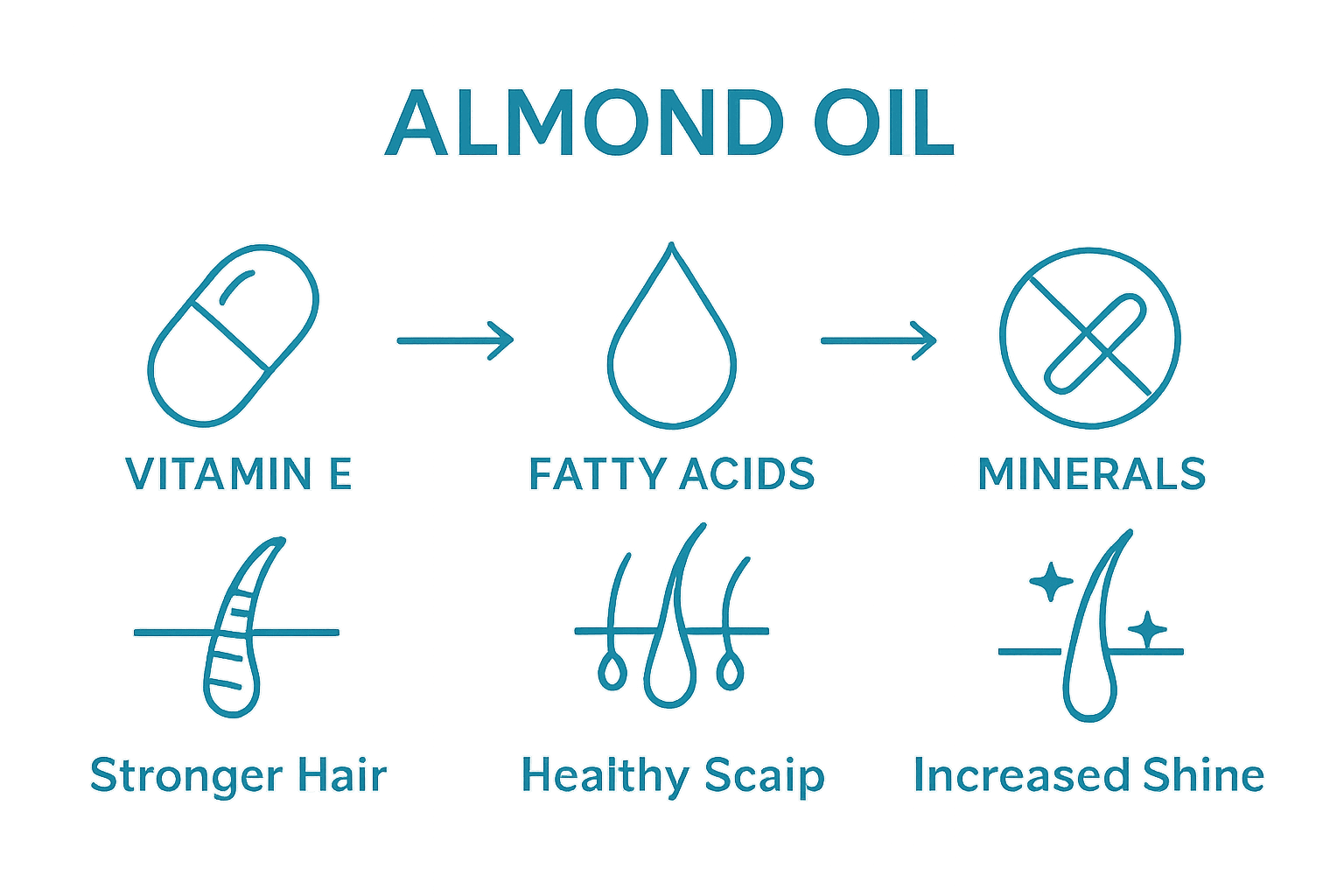Blog
Learning Materials
Understanding Almond Oil for Hair Growth
Updated: September 5, 2025

Almond oil is gaining serious attention for its role in hair care. This unassuming golden oil is packed with nutrients and has up to 76 percent oleic acid, making it stand out among natural hair treatments. Most people think of it as just another moisturizer but the real surprise is how its powerful blend of vitamins and fatty acids goes way beyond the surface. The real magic happens deep within your hair and scalp where this oil can potentially support true hair growth and restore health from the inside out.
Table of Contents
- What Is Almond Oil And Its Nutritional Profile?
- Why Is Hair Growth Important And How Can Almond Oil Help?
- How Does Almond Oil Promote Hair Health And Growth?
- Key Benefits Of Using Almond Oil For Hair Growth
- Real-World Applications Of Almond Oil In Hair Care
Quick Summary
| Takeaway | Explanation |
|---|---|
| Almond oil is rich in fatty acids. | It contains key fatty acids like oleic and linoleic acid, which promote health benefits for hair and skin. |
| Supports hair growth through nutrition. | Almond oil provides essential vitamins and minerals that help strengthen hair and stimulate healthy growth. |
| Acts as a protective barrier. | Its emollient properties coat hair strands, safeguarding them from environmental damage and reducing breakage. |
| Deeply penetrates for better results. | The molecular structure allows almond oil to penetrate deeply, moisturizing and nourishing hair from within. |
| Versatile use in hair care routines. | Almond oil can be applied in various ways, such as scalp massage or deep conditioning, to address specific hair issues. |
What is Almond Oil and Its Nutritional Profile?
Almond oil represents a nutrient-dense natural extract derived from pressed almonds, renowned for its exceptional composition and potential benefits for hair and overall health. This golden-hued liquid offers a complex nutritional profile that makes it uniquely valuable for various applications.
Chemical Composition and Nutritional Breakdown
At its core, almond oil is characterized by a remarkable fatty acid composition. Research from the Journal of Food Science and Technology reveals that almond oil contains a substantial proportion of critical nutrients:
- Oleic Acid: Comprises 62-76% of the total fatty acid content
- Linoleic Acid: Represents approximately 14-30% of fatty acids
- Palmitic Acid: Accounts for roughly 5-7% of the total composition
The oil is particularly rich in essential micronutrients, including:
- Vitamin E (tocopherols)
- Potassium
- Phosphorus
- Calcium
- Magnesium
Functional Properties and Potential Benefits
Beyond its impressive nutritional profile, almond oil demonstrates multifaceted properties that contribute to its widespread use. Complementary research in clinical practice suggests potential attributes including anti-inflammatory characteristics and immune system support.
The molecular structure of almond oil enables deep penetration, which makes it particularly effective for hair and skin applications. Its emollient properties help moisturize and protect, creating a protective barrier that can potentially support hair growth and scalp health.
Understanding almond oil's intricate nutritional composition provides insight into why it has become a popular natural ingredient in hair care routines. The combination of fatty acids, vitamins, and minerals makes it a promising option for individuals seeking holistic approaches to hair and skin wellness.
To help clarify the important compounds that make almond oil beneficial for hair, the following table summarizes its key fatty acids and micronutrients along with their roles in hair health.
| Nutrient | Type | Proportion in Almond Oil | Role in Hair Health |
|---|---|---|---|
| Oleic Acid | Monounsaturated Fatty Acid | 62-76% | Enhances moisture, supports flexibility |
| Linoleic Acid | Polyunsaturated Fatty Acid | 14-30% | Promotes strength, helps prevent breakage |
| Palmitic Acid | Saturated Fatty Acid | 5-7% | Adds texture, supports healthy cuticle |
| Vitamin E (Tocopherol) | Antioxidant Vitamin | Present | Protects from oxidative damage |
| Potassium | Essential Mineral | Present | Supports follicle function |
| Calcium | Essential Mineral | Present | Strengthens hair shaft |
| Magnesium | Essential Mineral | Present | Supports scalp circulation |
Why is Hair Growth Important and How Can Almond Oil Help?
Hair growth represents more than a cosmetic concern. It serves as a critical indicator of overall health and personal well-being, influencing both physical appearance and psychological confidence. Understanding the significance of healthy hair growth and the potential role of natural solutions like almond oil can transform how we approach hair care.
The Significance of Healthy Hair Growth
Research in the International Journal of Trichology highlights that hair growth contributes substantially to an individual's psychological and social dynamics. Healthy hair acts as a protective mechanism for the scalp and plays a crucial role in self-perception and social interactions.
Key aspects of hair growth importance include:
- Protection of the scalp from environmental stressors
- Indication of overall nutritional and health status
- Significant impact on personal confidence and self-image
- Potential early warning sign of underlying health conditions
Almond Oil's Potential in Supporting Hair Growth
Almond oil emerges as a promising natural intervention for supporting hair health. Research from the Journal of Cosmetic Dermatology suggests that its unique composition offers multiple benefits for hair growth and maintenance.
The oil's effectiveness stems from its rich nutritional profile, which includes:
- Emollient properties that condition hair strands
- Fatty acids that potentially strengthen hair fibers
- Vitamin E content supporting scalp health
- Potential to minimize protein loss in hair
By understanding how almond oil interacts with hair follicles and scalp environment, individuals can explore targeted hair growth solutions that leverage natural ingredients. Its molecular structure enables deep penetration, potentially supporting hair growth mechanisms and overall scalp wellness.
Effective hair care is not just about external appearance but represents a holistic approach to personal health and self-care. Almond oil provides a natural, potentially supportive option for those seeking to enhance their hair growth journey.
How Does Almond Oil Promote Hair Health and Growth?
Almond oil represents a sophisticated natural intervention for supporting comprehensive hair health, operating through multiple intricate mechanisms that address both surface-level hair conditions and deeper follicular interactions. Understanding these mechanisms reveals why this natural extract has gained significant attention in hair care strategies.
Molecular Interactions and Hair Penetration
Research in the Journal of Cutaneous and Aesthetic Surgery reveals that almond oil's unique molecular structure enables profound interactions with hair strands and scalp environment. Its fatty acid composition allows deep penetration, creating a multifaceted approach to hair wellness.
Key molecular interactions include:
- Penetrating the hair cuticle to restore internal moisture
- Binding with protein structures to reduce structural damage
- Coating hair strands to create a protective external barrier
- Delivering essential nutrients directly to hair follicles
Scalp Health and Nutritional Support
Beyond surface-level benefits, almond oil provides comprehensive nutritional support critical for sustainable hair growth. Its rich composition of vitamins, minerals, and antioxidants creates an optimal environment for robust hair development.
Critical nutritional contributions involve:
- Vitamin E's antioxidant protection against cellular damage
- Fatty acids that strengthen hair protein structures
- Minerals supporting overall scalp microenvironment health
- Potential reduction of inflammation that might impede hair growth
Individuals seeking holistic hair care strategies can explore comprehensive natural oil treatments that complement almond oil's beneficial properties. The intricate balance of nutrients and protective mechanisms positions almond oil as a promising natural approach to supporting healthy, resilient hair growth.
To provide a quick reference for the distinctive ways almond oil supports hair growth and scalp health, here is a table summarizing key mechanisms and their specific benefits.
| Mechanism | Description | Benefit for Hair |
|---|---|---|
| Deep Penetration | Oil molecules penetrate the hair shaft | Moisturizes hair from within |
| Protein Structure Binding | Fatty acids bind with hair proteins | Reduces damage and protein loss |
| Protective Barrier Formation | Coats hair strands and scalp surface | Shields from environmental harm |
| Nutrient Delivery | Delivers vitamins and minerals to follicles | Supports healthy hair growth |
| Anti-Inflammatory Action | Reduces scalp inflammation | Promotes ideal growth environment |
| Antioxidant Protection | Vitamin E protects against oxidative stress | Prevents premature hair thinning |
Key Benefits of Using Almond Oil for Hair Growth
Almond oil emerges as a powerful natural solution for individuals seeking comprehensive hair health and growth support. Its unique composition offers a multi-dimensional approach to addressing hair and scalp challenges, making it a versatile and effective treatment option.
Nutritional and Protective Hair Advantages
Research highlighting almond oil's bioactive properties demonstrates its remarkable potential for hair restoration and maintenance. The oil's rich nutritional profile provides substantial benefits that extend beyond surface-level treatment.
Key nutritional advantages include:
- Enhanced blood circulation to hair follicles
- Strengthening of hair protein structures
- Prevention of premature hair thinning
- Delivery of essential vitamins directly to hair roots
Protective Mechanisms and Scalp Health
Beyond nutritional support, almond oil offers critical protective mechanisms that contribute to overall hair resilience. Scientific analysis reveals its comprehensive approach to hair and scalp wellness.
Protective benefits encompass:
- UV damage mitigation
- Improvement of hair elasticity
- Creation of a protective barrier around hair strands
- Reduction of oxidative stress on hair follicles
Individuals interested in optimizing their hair care routine can explore targeted hair growth strategies that complement almond oil's natural healing properties. The synergistic combination of nutritional support, protective mechanisms, and gentle treatment positions almond oil as an exceptional choice for those seeking holistic hair growth solutions.

Real-World Applications of Almond Oil in Hair Care
Almond oil transcends theoretical benefits, offering practical and versatile solutions for individuals seeking comprehensive hair wellness. Its adaptability across different hair care scenarios makes it a valuable natural intervention for addressing diverse hair and scalp challenges.
Targeted Hair Treatment Strategies
Research in dermatological applications demonstrates almond oil's effectiveness in addressing specific hair concerns. Its multifaceted properties enable targeted interventions for various hair and scalp conditions.
Practical application strategies include:
- Scalp massage to stimulate blood circulation
- Deep conditioning treatment for dry, brittle hair
- Natural remedy for reducing scalp inflammation
- Protective pre wash treatment against environmental damage
Specialized Hair Care Scenarios
Beyond general hair maintenance, almond oil proves particularly beneficial in specialized hair care contexts. Its gentle yet effective nature makes it suitable for addressing complex hair and scalp challenges.
Specialized application scenarios involve:
- Managing dandruff and dry scalp conditions
- Supporting hair recovery after chemical treatments
- Providing natural conditioning for curly and textured hair
- Mitigating effects of heat and styling damage
Individuals seeking comprehensive hair wellness can explore advanced natural hair treatment techniques that complement almond oil's versatile properties. The strategic application of this natural oil offers a holistic approach to maintaining healthy, resilient hair across diverse hair types and conditions.

Turn Almond Oil Insights Into a Custom Hair Growth Plan
Are you frustrated by slow hair growth or worried about thinning hair despite using natural solutions like almond oil? Understanding the science behind almond oil is powerful, but seeing real results takes more than just guesswork. That is where MyHair.ai steps in. Our platform connects the unique benefits of almond oil with AI-driven personalization, giving you a clear path forward based on your individual hair needs and goals.

Take control of your hair growth journey today. Upload your hair scan to MyHair.ai and receive an in-depth analysis that uses your own data. Get tailored recommendations built on proven research, track your progress, and explore targeted hair growth strategies that fit your profile. Do not wait for change to happen on its own. Visit MyHair.ai and start your personalized pathway to healthier, fuller hair now.
Frequently Asked Questions
What are the nutritional benefits of almond oil for hair growth?
Almond oil is rich in oleic acid, linoleic acid, and essential micronutrients like vitamin E, potassium, and calcium, which nourish hair and promote healthy growth.
How does almond oil support scalp health?
Almond oil's emollient properties create a protective barrier on the scalp, providing moisture and essential nutrients that can reduce inflammation and support overall scalp health.
Can almond oil help with dry and damaged hair?
Yes, almond oil acts as a deep conditioning treatment that restores moisture, strengthens hair fibers, and prevents protein loss, making it effective for dry and damaged hair.
How should I use almond oil for the best results?
For optimal results, apply almond oil through a scalp massage to stimulate circulation, use it as a deep conditioning treatment, or apply it as a protective pre-wash treatment to shield hair from environmental damage.